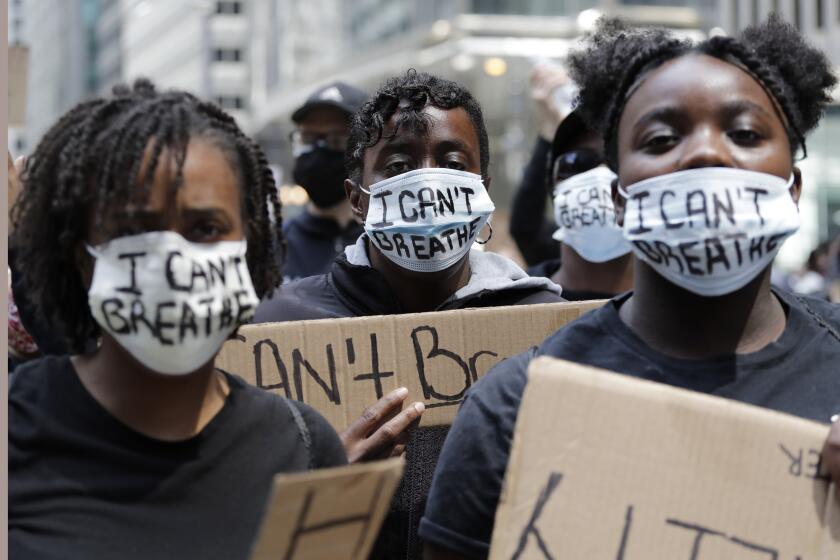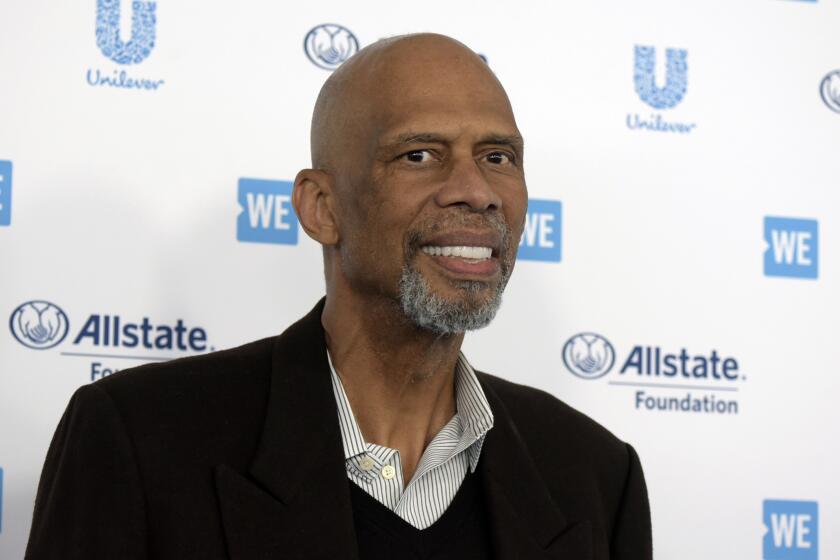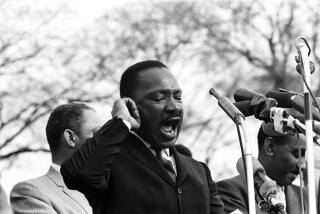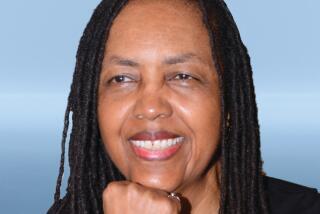On Juneteenth, Kareem Abdul-Jabbar’s ‘Fight the Power’ tackles the history of protest
In late April, when Derek Chauvin was found guilty on charges of murder in the death of George Floyd, the moment, for Kareem Abdul-Jabbar, reinforced a theme that is at the center of his documentary “Fight the Power: The Movements That Changed America”: Protest matters.
“It was a very satisfying moment to see him being taken off in handcuffs and incarcerated,” the six-time NBA champion told The Times. “That meant a lot to a lot of Americans who never thought they’d see that day.”
Chauvin’s conviction came less than a year after a summer of protests against police brutality that reshaped the global conversation around racial inequality. The grassroots demonstrations, which brought more than 15 million people to the streets in 2,000 cities in all 50 states, are estimated to be the largest in American history.
They also inspired Abdul-Jabbar’s hourlong documentary, which offers a broad overview of how protest is part of the American DNA.
“I’ve long known that incidents like that happen, but most Americans don’t know that because most white Americans do not get discriminated against based on their racial background,” Abdul-Jabbar said. “It was hard for them to believe that could be the basis for so much pain. And then when they saw what happened to George Floyd, it really pulled the mask off that situation.”
The main concern of black people right now isn’t whether they’re standing three or six feet apart, but whether their sons, husbands, brothers and fathers will be murdered by cops.
The film, executive-produced by Abdul-Jabbar’s longtime business partner Deborah Morales, starts with the labor protests and the widespread change effected by the 1911 Triangle Shirtwaist Factory fire, in which 146 New York City workers, including 123 women, died after being trapped in the inferno. “Fight the Power” flows fluidly through American history as women protested for the right to vote, the Black community protested for equal treatment under the law and the LGBTQ+ community protested for freedom of expression.
“We show that it all has a basis for most of the different groups in the same issue: fair treatment,” said Abdul-Jabbar, who is the project’s narrator.
The Juneteenth release of the documentary also intersects with Pride Month and acknowledges the LGBTQ+ community’s essential place in the history of protest movements. In “Fight the Power,” Abdul-Jabbar explains how the murder of gay college student Matthew Shepard in 1998 helped him better understand the severity of prejudice toward the LGBTQ+ community. “Injustice anywhere is a threat to justice everywhere,” Abdul-Jabbar quotes the Rev. Martin Luther King Jr. in the documentary. “I cannot call myself a champion of civil rights unless I champion everyone’s civil rights.”
“In the past couple of years, we’ve come to see how that statement is so true,” Abdul-Jabbar said. “Any marginalized group that is allowed to be brutalized and ostracized can tell you that it’s the same situation for all of us. It might be a different reason why they come after your group or my group, but we’re all going to end up in the same boat, so we have to be willing to stand up for the rights of all people, especially marginalized people, because at one time or another, we’ll all end up in that box.”
The relatively quick and bipartisan passage of a bill to create Juneteenth National Independence Day contrasts sharply with previous federal holiday battles.
King’s influence on the Hall of Famer runs much deeper. When he was in high school, Abdul-Jabbar, then Lew Alcindor, was invited to cover a King news conference through the Harlem Youth Action Project. The moment would both solidify, and prompt him to challenge, his beliefs about fighting for social justice.
“I was a little nervous because here I am just a teenager in high school,” Abdul-Jabbar said in his interview with The Times. “It was a wonderful experience for me to get that close to [King] and to speak to him and to get a feeling of what he was all about. And you know, it really helped me with some choices because up to that point, I’d been more in favor of Malcolm X because he talked about not going and letting our demonstrators being beaten.
“The whole idea of retaliation for all of those horrible incidents where Black demonstrators were abused, you know, I wanted to retaliate. Dr. King’s message of patience and nonviolent resistance really seemed on second thought to make more sense, and it ended up being the key to making the civil rights movement work.”
The documentary spends considerable time on the influence of King and several others, including those who participated in the March on Washington, in such landmark legislations as the 1964 Civil Rights Act and the 1965 Voting Rights Act.
“After meeting Dr. King and really getting into his philosophy, I saw where the power was in it,” Abdul-Jabbar said in the film. “It really embarrasses and totally takes the face away from oppressors when they’re shown to be the bullies that they are.”
Kareem Abdul-Jabbar celebrates the cultural oasis that was Central Avenue in Los Angeles.
While King and Malcolm X are often depicted as opposites, “Fight the Power” explains how the two men’s philosophies complemented each other.
“Dr. King and Malcolm X are two sides of the same coin,” historian Tyree Boyd-Pates said in the documentary. “You need this militancy. You also need this form of nonviolence in order to provoke the system of oppression.”
Rosa Parks, who refused to give up her seat on a Montgomery, Ala., bus in 1955, serves as an example in the film of the role Black women played in the protest movement, and the dual discrimination they suffered because of their race and gender. During the suffrage movement, Black women were asked to march at the back of the line.
Abdul-Jabbar cited the example of former WNBA most valuable player Maya Moore as an athlete and Black woman who has carried on the legacy of Parks. Three years ago, Moore, still performing at an elite level, left her basketball career to advocate for the exoneration of a Missouri man, Jonathan Irons, for his murder conviction nearly a quarter-century earlier. In late June 2020 Irons was released from prison.
The Kareem Abdul-Jabbar Social Justice Champion award will honor NBA players committed to community action, social change and justice.
For Abdul-Jabbar, that advocacy recalled his own statement when he boycotted the 1968 Olympics and stood beside Muhammad Ali during his ban from boxing as he protested the Vietnam War. In 2016 he received the Presidential Medal of Freedom, the highest honor a civilian can receive, from the country’s first Black president, Barack Obama.
“For me, it made me feel that all the things that I’d done to stand up for my rights and to point out injustice and inequality, it made me feel that It wasn’t a waste of time,” Abdul-Jabbar said.
He is being acknowledged yet again; last month the NBA announced the creation of the Kareem Abdul-Jabbar Social Justice Champion award. Each year, the league will acknowledge players who make a significant impact in their community and donate funds to a charity of their choice. The finalists for the inaugural award are Carmelo Anthony, Harrison Barnes, Tobias Harris, Jrue Holiday and Juan Toscano-Anderson. The winner will be announced prior to Game 4 of the Eastern Conference Finals.
“I’m very proud of that, that the NBA has seen fit to use my name and my history to get some credibility for this award,” he said. “I’m very honored by that.”
"Fight The Power: The Movements That Changed America"
Airs June 19 at 5 p.m. PDT on the History Channel
More to Read
All things Lakers, all the time.
Get all the Lakers news you need in Dan Woike's weekly newsletter.
You may occasionally receive promotional content from the Los Angeles Times.









